Cats are known for their sleek and glossy coats, but what happens when your furry companion’s fur appears oily and greasy? As a cat owner, it can be disconcerting to see your pet looking less than their best. So, why is your cat’s fur oily?
Well, cats are meticulous self-groomers, and their fur serves as an essential barrier against the elements. It keeps them warm in the winter and cool during hotter months. However, if your feline friend’s coat is excessively greasy or oily, it could indicate an underlying issue such as a medical condition or poor grooming habits.
In this blog post, we’ll explore the various reasons why your cat’s fur may be oily. We’ll discuss medical causes such as seborrhea and how poor nutrition or grooming techniques can also contribute to an oily coat. Additionally, we’ll differentiate between an oily coat and a shiny one while shedding light on ways to prevent and manage greasy fur.
It’s important to understand that feline grooming differs from canine grooming and plays a vital role in maintaining your cat’s overall health. By learning about the causes of oily cat fur and taking appropriate action, you can help keep your beloved pet healthy and happy.
So, let’s get started.
. What is Oily Fur in Cats?
While cats are known for their lustrous and velvety fur, sometimes it can become oily, which can be a red flag for underlying health issues. In this article, we will dive into the causes of oily fur in cats and how to deal with it.
One of the primary culprits of oily fur in cats is overactive sebaceous glands. These glands produce sebum, an oily substance that helps to moisturize and protect the skin and coat. However, when these glands go into overdrive, they produce too much sebum, leading to greasy and oily fur.
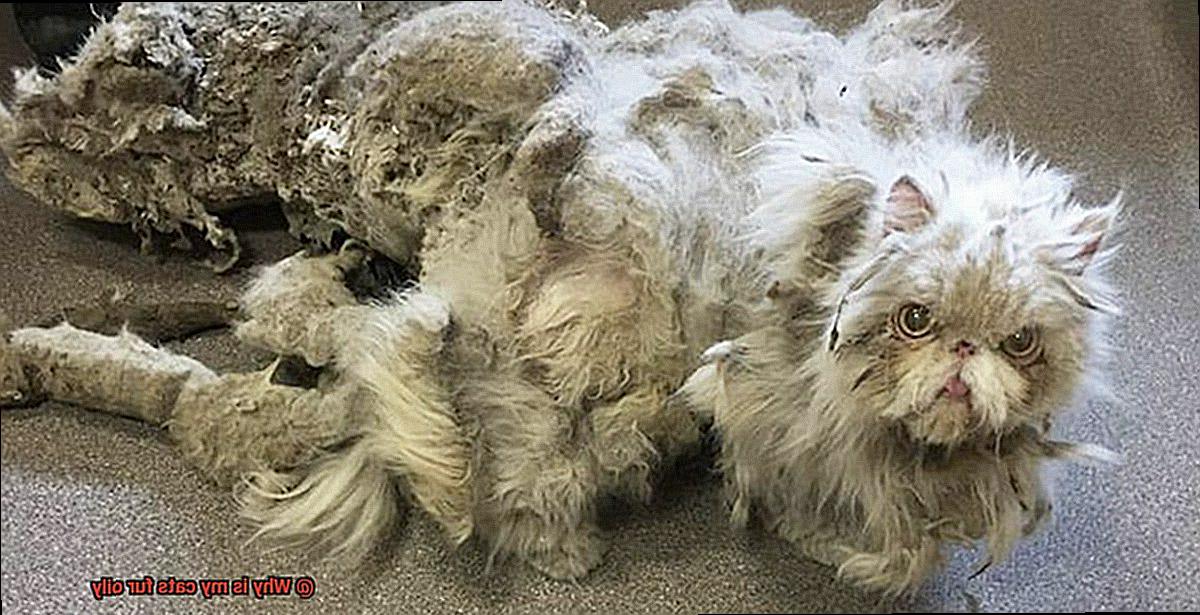
Another cause of oily fur in cats is a poor diet. Cats require a diet that’s rich in protein and low in carbohydrates to maintain a healthy skin and coat. If your feline friend’s diet lacks essential nutrients, it can cause their skin and coat health to deteriorate, leading to oily fur.
In addition, certain medical conditions can trigger oily fur in cats. Hormonal imbalances like hyperthyroidism or Cushing’s disease can impede the cat’s skin and coat health, causing oily fur. Skin infections or infestations such as fleas and mites can also lead to excessive oil production and result in greasy fur.
If you detect that your cat’s fur is oily, it’s vital to take action promptly. This can help prevent further complications and discomfort for your furry friend. To treat oily fur, first, identify the root cause. If it’s due to overactive grooming or an inadequate diet, make changes accordingly. If it results from a medical condition, consult with a veterinarian immediately to determine appropriate treatment options.
. Why is it Important to Address Oily Fur in Cats?
Don’t ignore this issue, as oily fur in cats can be a sign of an underlying health issue that needs to be addressed. As an expert on this topic, I’m here to explain why it’s so important to take action when you notice oily fur in your feline friend.
Oily fur in cats can be caused by poor grooming habits, but it can also be a sign of an underlying health condition such as seborrhea or hyperthyroidism. This can lead to discomfort and skin irritation, causing your cat to scratch and bite, which can create open wounds that are susceptible to infection. Additionally, the oils on the fur can attract dirt and debris, making your cat’s coat look dirty and unkempt.
Ignoring oily fur can lead to serious health issues for your cat. Open wounds caused by scratching and biting can become infected, leading to more serious medical problems. Moreover, if the underlying health condition causing the oily fur is left untreated, it could lead to even more serious health issues down the line.
So why is it important to address this issue? For starters, your cat’s comfort is at stake. Oily fur can cause discomfort and even pain if left untreated. Regular grooming, including brushing and bathing, is key to keeping your cat’s coat healthy and free of excess oils. It’s also important to address any underlying health issues that may be contributing to the problem. Your veterinarian can help diagnose and treat any health issues that may be causing your cat’s oily fur.
Causes of Oily Fur in Maine Coon Cats
If you’ve noticed your cat’s fur is looking a bit oily and greasy lately, it could be a sign of an underlying health issue that requires attention.
Over-Grooming
However, when grooming becomes excessive, it can lead to some unpleasant outcomes. Oily fur is a common sign of over-grooming in cats. In this post, we will delve into the reasons behind over-grooming and how to treat this issue.
Over-grooming occurs when a cat removes the natural oils that keep its coat healthy and shiny. This can cause dry and irritated skin, leading to excessive oil production. Stress and anxiety are major reasons why cats may over-groom themselves. Boredom or lack of stimulation can also lead to over-grooming, as well as allergies or skin irritations.
If your cat is over-grooming, it’s important to identify and address the underlying cause to prevent further issues. Providing your cat with plenty of toys and activities can help alleviate boredom and stress. Interactive toys like scratching posts can keep your cat entertained and prevent excessive grooming.
If allergies or skin irritations are causing the problem, consult with your vet. They may prescribe medication or recommend special shampoos or topical treatments to soothe irritated skin and reduce the urge to groom excessively.
Monitoring your cat’s grooming habits is crucial. If you notice your cat excessively licking or biting its fur, try distracting it with a toy or treat. You may also want to consider using a deterrent spray or collar to discourage over-grooming.

Poor Diet
Yes, it’s true. When your cat’s diet lacks essential nutrients, it can affect their skin and coat health. Fats and oils are crucial for maintaining healthy skin and coat. However, too much of it can cause an overproduction of sebum, leading to oily fur.
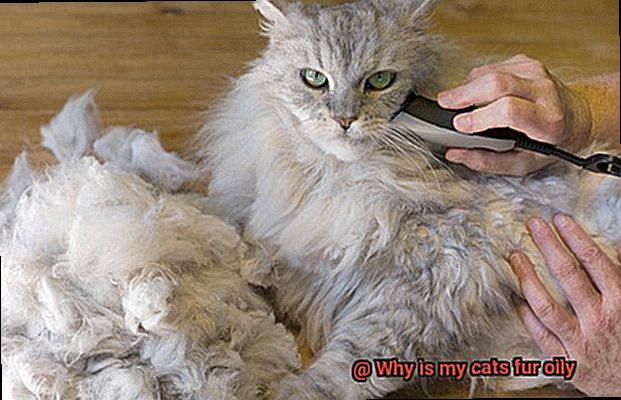
To avoid this, ensure that your cat’s diet is balanced and provides all the necessary nutrients. For instance, cats require a diet that is high in protein and low in carbohydrates. A high carbohydrate diet can lead to insulin resistance, causing inflammation and skin problems. Moreover, cats need specific fatty acids like omega-3 and omega-6 for healthy skin and coat. Failure to include these fatty acids in your cat’s diet may result in dry, flaky skin or oily fur.
Therefore, it’s crucial to provide your cat with quality nutrition that includes all the necessary nutrients for their overall health and wellbeing. If you’re unsure about what to feed your furry friend, consult with a veterinarian to determine the best type of food for them.
Skin Infections/Allergies
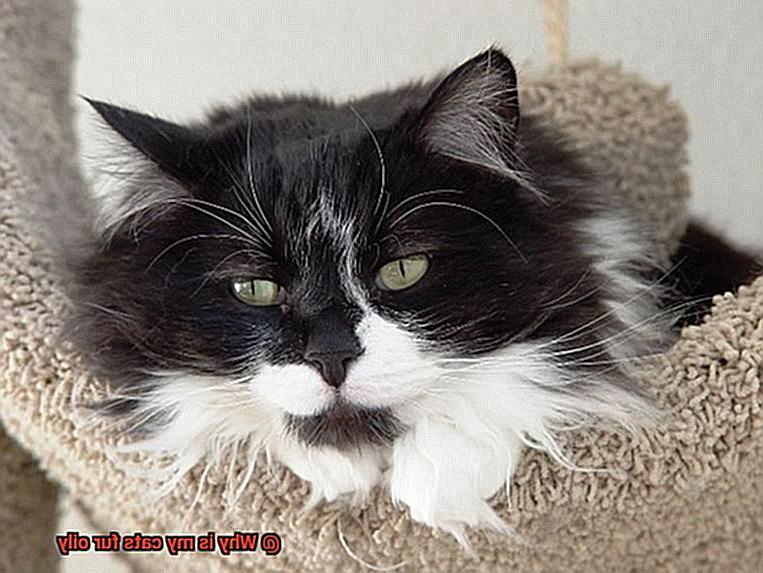
When you notice your cat’s fur looking oily, it’s essential to investigate further. Oily fur in cats is often a symptom of skin infections or allergies that require immediate attention. In this post, we will explore the causes of oily fur in cats and provide you with tips on how to prevent it.
Bacterial and fungal infections are the most common types of skin infections that can lead to oily fur in cats. These infections cause an overproduction of oil, leading to greasy and oily fur. If you suspect that your cat has a skin infection, take them to the veterinarian for proper diagnosis and medical treatment.
Allergies are another culprit of oily fur in cats. Your cat can be allergic to various things such as specific foods, environmental allergens like pollen, dust or mold spores, or flea bites. When a cat is allergic to something, their body produces histamines that cause inflammation and irritation in the skin. This can lead to the overproduction of oil, resulting in greasy fur. Consult with your vet for proper diagnosis and treatment if you suspect that your cat has an allergy.
In addition to medical treatment, making changes to your cat’s environment or diet can help prevent further skin issues. For example, switching to a different type of cat food if they’re allergic to a specific food ingredient, providing them with an air purifier at home if they’re allergic to environmental allergens, or cleaning their bedding more frequently can help.
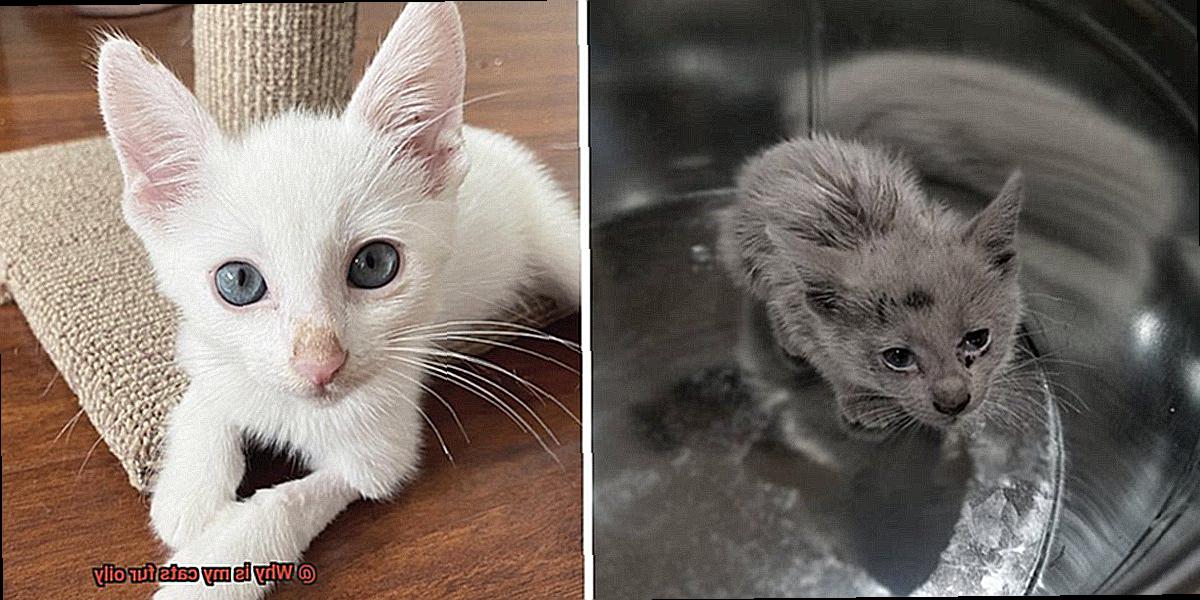
It’s crucial to pay attention to your cat’s fur and skin health. If you notice any changes or abnormalities, consult with your vet immediately. By taking proper care of your cat’s skin and coat and seeking medical attention when necessary, you can help prevent oily fur and other skin issues.
Finally, ensuring that your cat has a well-balanced diet full of protein and fatty acids like omega-3 and omega-6 is also essential for healthy skin and coat.
By providing your furry friend with a luxurious spa treatment from the inside out, you can help prevent oily fur and promote overall health and wellbeing.
Hormonal Imbalances/Thyroid Issues
Hormonal imbalances and thyroid issues are common culprits when it comes to changes in your cat’s coat. As an expert in this field, I’m here to provide you with some valuable insights on how these conditions affect your feline friend.
The thyroid gland, located in your cat’s neck, produces hormones that regulate important bodily functions like metabolism and energy levels. Unfortunately, when this gland isn’t functioning properly, it can lead to an overactive or underactive thyroid, which can cause a range of symptoms – including changes in your cat’s coat.
If your cat has an overactive thyroid, or hyperthyroidism, their fur may become oily and greasy. This is because the thyroid gland is producing too many hormones, which can increase sebum production in the skin. Sebum is an oily substance that keeps the skin and fur lubricated, but too much of it can lead to a greasy coat.
On the other hand, if your cat has an underactive thyroid, or hypothyroidism, their fur may become dry and brittle instead of oily. This happens because the thyroid gland isn’t producing enough hormones to keep the skin and fur moistened.
If you suspect that your cat is experiencing hormonal imbalances or thyroid issues, don’t hesitate to consult with your veterinarian. They can perform blood tests and other diagnostic exams to determine if there is an underlying medical condition causing your cat’s oily fur. Treatment options may include medication or surgery to correct the issue and restore your cat’s coat to its normal state.
Symptoms of Oily Fur in Maine Coon Cats
You may have noticed your furry friend’s once long and luscious coat has become oily and greasy. But don’t worry, this can be an indication of an underlying issue that can be addressed if you know what to look for. So, let’s dive into the symptoms of oily fur in Maine Coon cats, shall we?
The most obvious symptom of oily fur is a greasy and oily coat. This may feel sticky to the touch and may have a distinct odor.
Oily fur can also lead to matting, where the hairs become tangled and clump together, making it difficult to brush or groom your cat. And if left untreated, oily fur can also cause skin irritation due to the excess oil clogging pores, causing inflammation.
Excessive grooming could also be a sign of oily fur. Your feline friend will often try to groom away the excess oil, which can lead to bald patches or skin irritation. Additionally, oily fur can disrupt the natural balance of oils on your cat’s skin, leading to dandruff or flaky skin.
But wait, before you panic, remember that these symptoms may also be indicative of other health issues such as allergies or infections. Therefore, it’s crucial to consult with a veterinarian if you notice any of these symptoms in your Maine Coon cat. They will help determine the underlying cause and develop a tailored treatment plan for your furry friend.
Diagnosing the Cause of Oily Fur in Maine Coon Cats
Don’t fret, as oily fur in Maine Coon cats could be a sign of an underlying health issue that requires attention. Let’s explore the steps you should take to diagnose the cause of oily fur and help your feline friend get back to their shiny best.
Firstly, observe your cat’s behavior and lifestyle. Is your cat consuming a well-balanced diet? Are they drinking enough water and exercising regularly? These factors can all contribute to the health of your cat’s skin and coat. A healthy lifestyle leads to healthy skin and fur.
Another important factor is your Maine Coon’s grooming routine. With their long hair, Maine Coons require more frequent brushing and grooming to prevent matting and tangles. A lack of grooming can lead to a buildup of oils on the skin and fur.
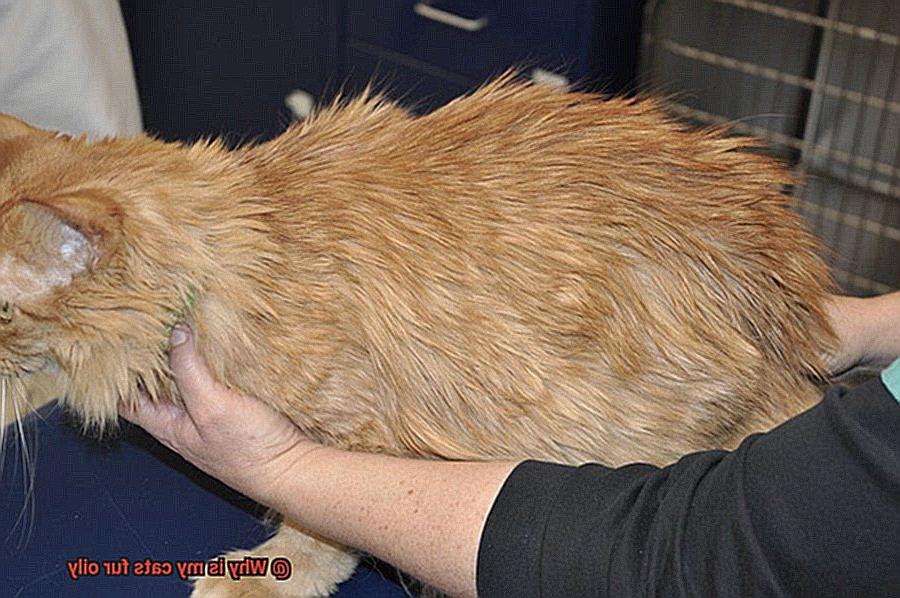
If diet and grooming are not the culprits behind your cat’s oily fur, it’s time to seek advice from a veterinarian. Oily fur could be a symptom of various health conditions like allergies or hormonal imbalances. A vet can conduct tests and exams to determine the underlying cause and recommend appropriate treatment options.
Treatments for Oily Fur in Maine Coon Cats
Maine Coon cats are a sight to behold with their luxurious and long coats. However, if your cat’s coat appears excessively oily, it could be a cause for concern. Fortunately, there are various treatments available to manage oily fur in Maine Coon cats and keep their coat looking healthy and glossy.
Overactive sebaceous glands are a common culprit behind oily fur in Maine Coon cats. These glands produce sebum, which is a natural oil that moisturizes and protects the skin and fur. However, if they become too active, they can cause an overproduction of sebum, leading to oily fur.
To combat this issue, it’s important to ensure your cat has a healthy diet rich in essential nutrients and vitamins. A balanced diet can help regulate sebum production and reduce oily fur. Additionally, regular grooming is crucial for managing oily fur in Maine Coon cats.
Frequent brushing and combing can help distribute the oils throughout the coat and prevent matting and tangling.
Using a high-quality shampoo specifically designed for oily fur can also be helpful in removing excess oil and keeping your cat’s coat looking healthy and shiny. If these methods don’t work, it may be necessary to seek veterinary treatment.
Your vet may recommend medicated shampoos or other topical treatments to manage the condition and prevent further complications.
Preventing Oily Fur in Maine Coon Cats
However, this also means that they are more susceptible to developing oily fur. Oily fur can be caused by various factors such as genetics, diet, and grooming habits. Luckily, there are several ways you can prevent oily fur in your Maine Coon cat and ensure their coat stays healthy and shiny.
The first step towards preventing oily fur is to consider your cat’s diet. A high-quality diet is essential for maintaining a healthy coat. Look for cat food that contains real meat and minimal fillers. Avoid foods that contain artificial preservatives, flavors, or colors as these can irritate your cat’s skin and cause excess oil production.
Regular grooming is also vital for preventing oily fur in Maine Coon cats. Daily brushing helps remove loose hair and evenly distribute natural oils throughout the fur. Use a gentle brush that won’t irritate your cat’s skin or cause any discomfort.
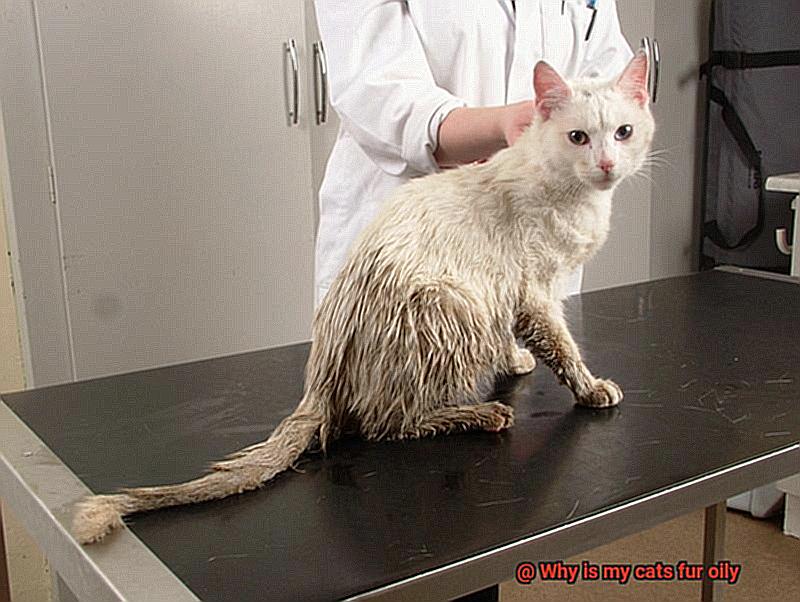
In addition to regular grooming, it’s crucial to bathe your Maine Coon cat on a regular basis. Use a mild shampoo specifically formulated for cats and rinse thoroughly to remove all traces of soap. After bathing, dry your cat thoroughly with a towel or blow dryer on a low setting to prevent excess moisture from accumulating in their fur.
If your Maine Coon cat still has issues with oily fur despite proper diet and grooming habits, it’s best to consult with your veterinarian. They may recommend additional treatments or medications to regulate your cat’s oil production and improve the overall health of their coat.
A4bOc2_kfX8″ >
When to See a Veterinarian for Your Cat’s Oily Fur Problem?
But if you’ve noticed that your Maine Coon’s fur is looking oily or greasy, it may be time to take them to see a veterinarian. While a little bit of oiliness can be normal, excessive oil production could be a sign of an underlying health problem.
There are several conditions that can cause oily fur in cats, including seborrhea, hyperthyroidism, and allergies. Seborrhea is a skin condition that causes the sebaceous glands to overproduce oil, resulting in greasy fur and often an unpleasant odor.
Hyperthyroidism, on the other hand, is a hormonal disorder that can cause a variety of symptoms, including increased oil production in the skin and fur. Allergies can also cause oily fur as a result of excessive scratching and grooming.
If your cat’s fur is excessively oily or greasy, it’s important to take them to see a veterinarian as soon as possible. Your vet may perform a physical exam and run some tests to determine the underlying cause of the problem. They may also recommend changes to your cat’s diet or prescribe medication to help manage their symptoms.
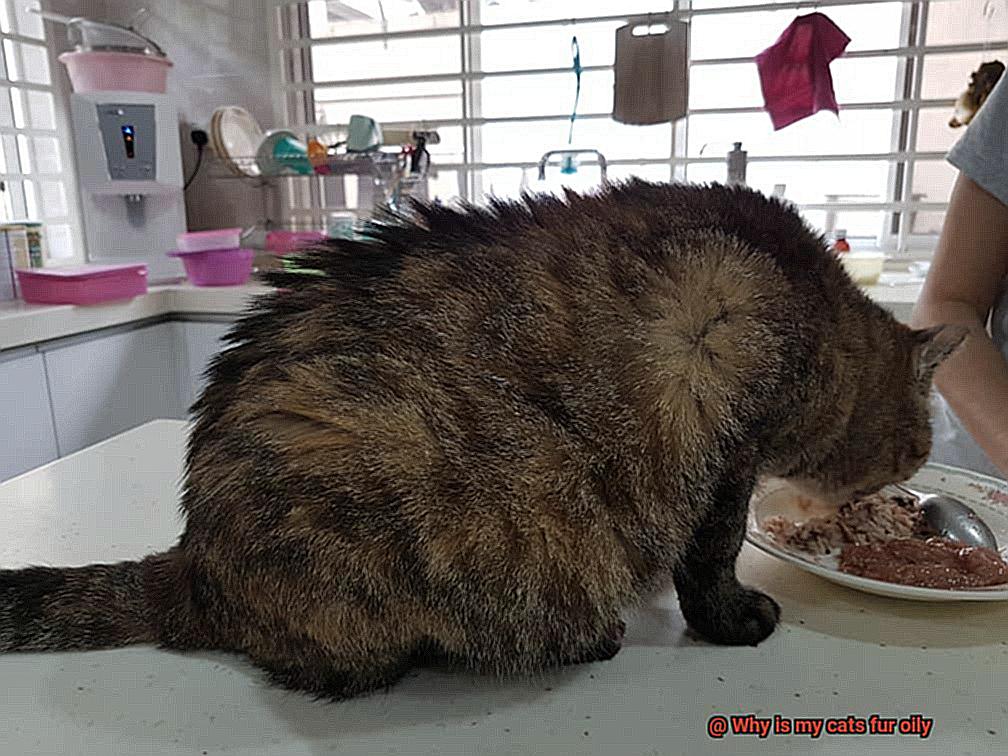
However, don’t worry. With proper care and attention, your Maine Coon can continue to look and feel their best. Prevention is key. A high-quality diet filled with essential fatty acids and regular grooming with a gentle brush can help prevent oily fur problems from occurring in the first place.
But if you do notice any changes in your cat’s fur or skin, don’t hesitate to seek veterinary care. Early detection and treatment of any underlying health problems are crucial for your cat’s long-term health and happiness.
In some cases, oily fur can be a sign of a more serious underlying health problem, such as liver disease or cancer. If your vet suspects that this may be the case, they may recommend further testing or referral to a specialist for further evaluation.
Also Read: Why Is My Cat’s Hair Oily And Clumping?
Conclusion
If you’ve noticed that your cat’s fur is looking oily or greasy, there could be a few different reasons for this.
One possibility is that your cat simply isn’t grooming themselves as well as they should be. This could be due to a medical issue, such as arthritis or dental problems, which can make it difficult for your cat to reach certain areas of their body.
Finally, stress and anxiety can also cause changes in your cat’s skin and coat health.







